
Best Meaningful PR Campaigns for Change (5 Examples)

In an era of social media, influencers and ‘fake news’ it can be harder than ever to create a brand presence that consumers can connect and empathise with, meaning creating meaningful PR is getting much more important.
PR has always been about sending a message as opposed to selling a product (however, that does help!) and with consumers becoming much more savvy and aware of advertisements they see online, using your brand and platform to raise awareness on a certain topic is becoming one of the trustworthy ways to create brand loyalty and awareness, and you can do this effectively through Digital PR.
With this in mind, we’ve scoured through many Digital PR campaigns launched over the last few months and pulled out 5 that we believe send a meaningful message whilst perfectly encapsulating the brand.
We understand that creating PR campaigns that make a meaningful statement can be daunting, so for help with your strategy, contact our team by phone at 0161 327 2635 or email [email protected].
1. The Burnout Report – Mental Health UK
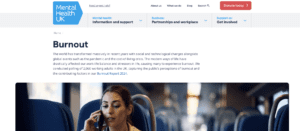
(Source: Mental Health UK)
At the start of 2024, Mental Health UK released their annual burnout report which revealed that one in five UK adults needed to take time off work in the past year due to stress. The survey dove into why staff were feeling so stressed, with reasons including increased workloads, feeling isolated in the workplace and working unpaid overtime.
The campaign was made up of a survey filled by 2,000 UK adults, expert commentary, case studies and professional recommendations all compiled into an in-depth report. This wasn’t all, however; they ended the report with a message to the UK prime minister to bring together government ministers, employers and other experts at a national summit to investigate how to create healthy workplaces and support employees more.
Why is it so meaningful? There have been a lot of changes to people’s work environments over the last few years. Despite all the benefits remote and hybrid working comes with, it has also led many to feel like the line between work and life balance has become more blurred, whilst, in 2023, over 300,000 people in the UK were economically inactive due to mental health issues.
Workplace stress is something that affects many of us, and external factors such as the cost-of-living crisis can make it worse – the alarming figures found in Mental Health UK’s report only solidified that this is an issue that needs to be discussed much more seriously.
2. The Big Dementia Conversation – CureUK
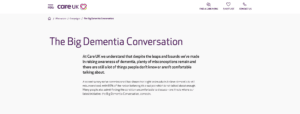
(Source: CureUK)
CureUK recently launched their campaign ‘The Big Dementia Conversation’ – created off the back of a survey looking at the UK’s attitudes towards dementia, with 69% of Brits believing that it’s a subject still not spoken about enough.
The results from this survey led to the creation of their online advice hub that looks at some of the less-talked-about symptoms of dementia, such as changes in personality, loss of inhibitions and changes in sexual behaviour. The conversations are led by Care UK’s Head of Nursing, Care and Dementia Suzanne Mumford, with support from Angela Rippon. The advice hub features videos, real-life stories and links to other helpful resources such as blog posts and articles.
Why is this meaningful? It was recently found that the number of people with dementia is predicted to rise by over 1.1 million by 2030, and over 900,000 people are estimated to be living with dementia in the UK right now according to Alzheimer’s Research UK. Despite this, CareUK’s survey found that whilst so many people believed dementia wasn’t spoken about enough, many also found the topic uncomfortable to talk about.
This campaign CareUK aims to change this and also raise awareness about some of the lesser-known symptoms and side effects of dementia that people might find uncomfortable to talk about through real-life stories and chats with those affected, making the topics more approachable.
3. The Quietest Places In World’s Noisiest Cities – Earth.FM
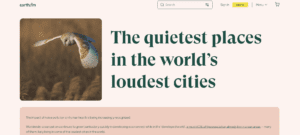
(Source: Earth.FM)
Earth. FM’s campaign highlighting the effects of noise pollution is a perfect example of how a heavily data-led index campaign can still send a meaningful message to consumers.
The campaign revealed how many residents in some of the biggest cities across the UK, USA and Europe are affected by noise pollution, then looked at nearby nature spots in and around cities to reveal the quietest spots – each being given a ‘quiet score’
Why is this meaningful? Whilst this might seem like your typical index campaign, this dives into a very real issue of how noise pollution has an impact on human health and how this is becoming worse as more of the world becomes urbanised. Noise pollution can cause stress and sleep disturbance which can affect mental health, alongside physical effects such as hearing difficulty and cognitive performance.
Earth.FM used this campaign as an opportunity to share this information and educate consumers on the importance of taking the time to immerse themselves in nature, calmness and natural sounds to ‘de-stress and recalibrate our nervous systems’
4. Female Group Chat: The Unsung Heroes Of Modern Dating – Pure.App
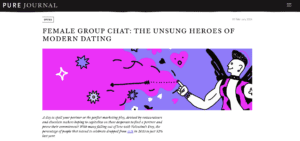
(Source: Pure.App)
Valentine’s Day is a day that every PR has circled in their calendar and the media landscape can become over-saturated with romantic, fluffy campaigns. Pure.app, however, took a different approach this Valentine’s Day with a campaign focusing on Galentine’s Day and surveying women on the way their friends play a role in their love lives.
The survey revealed that 1 in 5 women had planned on celebrating Galentine’s Day in 2024, whilst 80% of women would cancel a date to spend time with a female friend on Valentine’s Day.
Why is this meaningful: Whilst it would have made sense for a dating app to run a Valentine’s campaign around romance and dating, they instead opted for a wholesome campaign looking at the importance of female friendships amongst the battlefield of dating and relationships.
The campaign really highlighted the impact of these friendships on new and existing relationships, with 76% of women seeking dating advice from their friends and 66% consulting their female friends before breaking up with their partner.
5. Scrap The Roll Tax – Who Gives A Crap
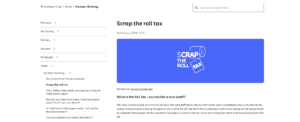
(Source: Who Gives A Crap)
Who Gives A Crap sells sustainable toilet paper, and one of their most recent campaigns ‘Scrap The Roll Tax’ took a slightly humorous approach to a very real and serious issue, with the campaign launching a petition to scrap the 20% VAT surcharge added to toilet roll.
The campaign was a stunt that saw a van being driven in front of Parliament which had a provocative image on the side accompanied by text saying ‘VAT on toilet roll? The Cheek Of It’ – alongside it a petition on Change.org was launched.
Why is this meaningful? In the current cost-of-living crisis, many people are making cuts just so they can afford essential items, despite this, hygiene items that can be considered a necessity are still being taxed whilst items such as caviar and gingerbread men aren’t. With the general price of toilet rolls rising, alongside this VAT cost, it’s getting more and more difficult for some Brits to afford basic and essential hygiene products.
One criticism of this could be that the brand’s toilet roll is slightly more expensive than other brands – which they were prepared for, to address this, Who Gives A Crap claimed that if the tax is removed they will invest all their savings into lowering the cost of their toilet roll.




